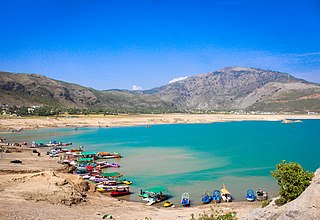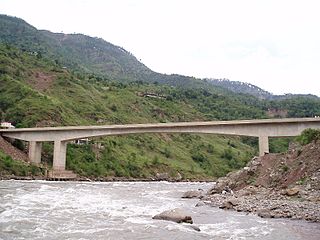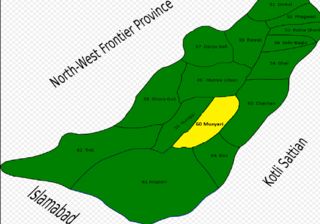
Rawalpindi District is a district located in the northernmost part of the Punjab province of Pakistan. Parts of the district form part of the Islamabad Rawalpindi metropolitan area. Rawalpindi city is the district capital.

Abbottabad District is a district in the Khyber Pakhtunkhwa province of Pakistan. It is part of the Hazara Division and Hazara region covers an area of 1,969 km2, with the city of Abbottabad being the principal town. Neighbouring districts include Mansehra to the north and Haripur to the west in Khyber Pakhtunkhwa, Muzaffarabad to the east in Azad Jammu and Kashmir and Rawalpindi to the south in the Punjab province.

Haripur District is a district in the Hazara Division of Khyber Pakhtunkhwa, Pakistan.

Murree is a mountain resort city, located in the Galyat region of the Pir Panjal Range, within the Murree District of Punjab, Pakistan. It forms the outskirts of the Islamabad-Rawalpindi metropolitan area, and is about 30 km (19 mi) northeast of Islamabad. It has average altitude of 2,291 metres (7,516 ft). The British built this town during their rule to escape the scorching heat in the plains of Punjab during the summer.

Pahari-Pothwari is an Indo-Aryan language variety of Lahnda group, spoken on the Pothohar Plateau in the far north of Punjab, Pakistan, as well as in most of Pakistan-administered Azad Kashmir and in western areas of Indian-administered Jammu and Kashmir, is known by a variety of names, the most common of which are Pahari, and Pothwari.

Hazara Division is an administrative division of the Khyber Pakhtunkhwa province of Pakistan. It is located along the Indus River and comprises eight districts: Abbottabad, Mansehra, Haripur, Battagram, Upper Kohistan, Kolai-Palas, Lower Kohistan, Torghar and most recently created Allai District. CNIC code of Hazara Division is 13.

Bhurban is a small town and a hill station in Muree District, West Punjab on the edge of Hazara, Pakistan. The resort town is named after a nearby forest. It is located approximately 11 kilometres (6.8 mi) from Murree city.

Rawalakot is the capital of Poonch district in Azad Kashmir, Pakistan. It is located in the Pir Panjal Range.

Lawrence College Ghora Gali is a school situated in Murree Tehsil, Punjab, Pakistan. The college is located in the foothills of the Himalayas and Pir Panjal at a height of about 1950 metres above sea level, covering an area of 150 acres (61 ha). It is 4 km from Murree and 57 km from Rawalpindi/Islamabad.
The Murree Rebellion of 1857 was a part of the Indian Rebellion of 1857. It was a skirmish between the hill tribes of Murree and the colonial government of British India. Resentment toward colonial rule had been mounting for many years following the establishment of British Raj in the subcontinent. There had been occasional isolated uprisings toward the British. The significance of the 1857 events was that, although not centrally coordinated, the uprisings had the feel of something much larger with real anticipation that colonial rule would be overthrown.

Kohala is a town in Pakistan on the River Jhelum, north of Murree, south of Muzaffarabad, and east of Bagh. The town was at the independence of Pakistan in 1947 a border town between newly created Pakistan and the princely state of Jammu and Kashmir, but is today only the border between the rest of Pakistan and Azad Kashmir.

Haro is the name of a river that flows through Khyber Pakhtunkhwa and parts of Punjab. It is a left tributary of the Indus. Its main valley is in Abbottabad District, in the Hazara Division of Khyber Pakhtunkhwa Province, northern Pakistan. The famous Khanpur Dam has been built on this river at Khanpur in the Haripur District of Hazara Division to provide drinking water to the twin cities, i.e. Islamabad and Rawalpindi. The decrease in inflows from Khanpur dam from the Haro River results in a water shortage in the twin cities during the summer season.

Nagri Tutial is one of the 57 union councils of Abbottabad District in Khyber Pakhtunkhwa province of Pakistan.

Kotli Sattian is a Tehsil (subdivision) of Murree District in the Punjab province of Pakistan. Its name is derived from the mountain town of Kotli and the Satti tribe. This subdivision is geographically a part of the Murree and Kahuta hills. It was declared a subdivision in 1990 by breaking up 40 villages out of both subdivisions.
Sehr Bagla is a village and Union Council of Murree Tehsil in the Murree District of Punjab, Pakistan. It is located in the north-east of the Tehsil and is bounded to the north by Potha Sharif, to the south by Ghel, to the west by Rawat and to the east by Kashmir

Musyari (Punjabi, Urdu: مسیاڑی is a village and union council of Murree Tehsil in the Murree District of Punjab, Pakistan.
The demographics of Rawalpindi District, a district of Punjab in Pakistan, has undergone significant changes over the years. It has been affected by turmoil in the surrounding districts.
Chirala (چڑالہ)[ ] is a village and Union Council of Dhirkot Tehsil in the Bagh District of Azad Kashmir.
Sardar Muhammad Abdul Qayyum Khan was a Kashmiri politician who also served as the president and prime minister of Azad Kashmir. He also remained President of All Jammu and Kashmir Muslim Conference for over 20 years. He belonged to the Dhund-Abbassi Tribe.













